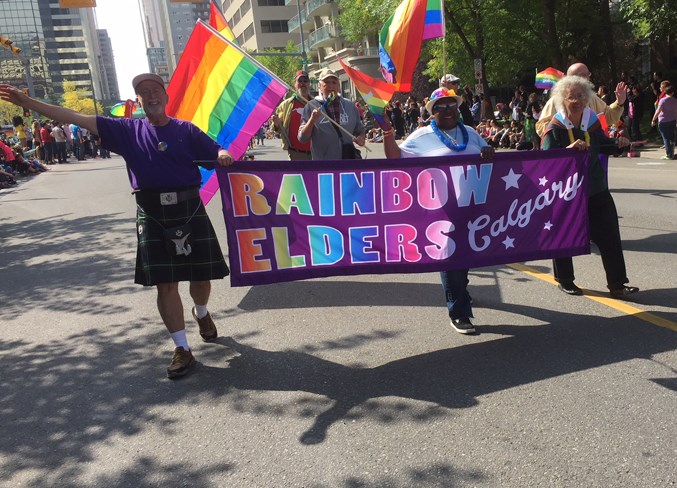A survey being conducted in Calgary and surrounding communities, including Cochrane, is looking to determine the housing needs of seniors in the LGBTQ+ community.
"It seems the greatest barrier is fear of stigma and discrimination," said Amanda Weightman project co-ordinator for Habitus Consulting Collective.
Weightman is working with Mount Royal University, which is supporting with ethics and peer researcher training, and the SHARP Foundation, the project's fiscal agent, to conduct the research which has been sponsored by the Calgary Homeless Foundation.
The goal of the survey is to help generate awareness and develop a greater understanding of some of the housing needs and challenges for LGBTQ+ seniors, especially as it might pertain to safety and identity.
"We don't know that it's an issue, but their have been a few statements floating around about people having to go back into closet," Weightman said of LGBTQ+ seniors who need to to go into care facilities.
Catherine Robertson, a Cochrane senior and one of three peer researchers from the LGBTQ+ community, is also involved in the project helping to circulate information around town trying to facilitate responses.
"This happens to be my biggest soap box," said Robertson, who believes there is a systemic problem of discrimination when it comes to older people in the LGBTQ+ community,especially for those in need of care facilities.
Part of the problem, Robertson believes, stems from wilful denial where service providers will state they don't have LGBTQ clients, which in a facility of 200 people is unlikely.
"If you deny it and then you see it, you are going to be counter to being positive," Robertson said.
The denial leads to a lack of awareness and resources, which promotes isolation and fear, a fact Robertson said is more prevalent in the senior population on both sides of the equation. People of that generation didn't have the same access to resources, support or even understanding compared to today, which Robertson said has resulted in maintained discrimination and prejudice.
"When I was growing up, transgender as a word didn't even exist," he said.
Robertson gave an example of a same-sex couple living in a care facility who are afraid to hold hands in public or others who feel they can't be 'out of the closet, which for Robertson's generation was something that took a long time to achieve.
"I only came out four years ago," the 65-year-old said, explaining it was a severe accident that led to the Robertson living the truth.
Despite the growing elderly population across the province, which means more LGBTQ+ seniors, Robertson said the system has failed to evolve to meet the needs of that demographic.
Rocky Wallbaum, who is with Rainbow Elders Calgary a senior focused LGBTQ+ group in the city, which is working to support the survey, echoed Robertson's concerns.
Wallbaum is also aiding in the development of a new curriculum with Alberta Health Services (AHS) focused on increasing awareness and sensitivity among health care providers. The curriculum is an effort to help AHS staff to consider solutions to issues unique to the LGBTQ+ community.
He pointed to an example of a gay man in a senior's home who developed Alzheimer's. The person, who also had AIDS, developed an increased libido as a side effect of his dementia. As a result, the care facility's method of treatment was to drug the man to the point he was confined to a chair in a near comatose state. There are also more covert problems, such as facility staff who will approach LGBTQ+ clients with Bibles and say "let me pray for you and help you get out of this being gay thing," Wallbaum said.
Aside from the physicality of the living arrangements, Wallbaum and Robertson are hopeful the survey will lead to more awareness and, as a result, innovation into how to deliver services to LGBTQ clients allowing them to live more fulfilling lives in their elderly years.
"In the most simple of terms it comes down to looking fro respect," said Weightman, who explained the results of the survey will be shared with focus groups comprised of stakeholders including service providers.
Form there, recommendations will be developed pertaining to what can be done to improve everything from access to quality of life," she said, adding that could be anything from something simple like shuttles to pride parades, to housing specifically geared toward LGBTQ+ seniors and allies.
Robertson is hopeful the research will lead to change, but added that change should come from the community developing more awareness and more respect for their fellow citizens through understanding.
"I'd like to see changes made without requiring legislation," Robertson said.
The survey, which is complete anonymous and only asks for postal codes to understand where issues are coming from is open until April 7 at midnight.
For those without computer or Internet access, Weightman has volunteers who will help people connect and navigate answering the questions. To request volunteer support call 403-660-0398.
To access the survey, go to https://www.surveymonkey.com/r/LGBTQ_SS.




